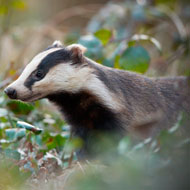BVA urges clarity over cull time frames

Eleven additional licences for badger control will be granted to parts of Devon, Wiltshire, Somerset, Dorset and Cheshire.
The BVA has urged clarity over badger cull time frames to ensure that they do not undermine England’s application for Officially TB-free status.
The call follows yesterday's announcement that 11 additional licences for badger control will be granted by the Government to parts of Devon, Wiltshire, Somerset, Dorset and Cheshire.
In a statement, BVA president Gudrun Ravetz said: “We are concerned that Government policy seems to have moved away from the original, evidence-based proposal of a six-week time limit for badger control within the open season, which enables an intensive, coordinated and effective operation in order to secure optimum disease control benefits.
“In terms of numbers, it is clear that badger population estimates have previously demonstrated considerable uncertainty and imprecision. It is critical that as accurate as possible population estimates, using an evidence-based methodology, are obtained and made openly available.
“We would urge clarity over cull time frames, numbers and mid-cull review methodology to ensure that the progress made, enabling the application for Officially TB Free status, is not undermined.”
Ms Ravetz also reiterated the BVA’s call to the government to use cage trapping and shooting to eradicate TB in England.
“While BVA supports badger culling as part of a comprehensive strategy for tackling bovine TB, we will continue to call on the Government to use the targeted and humane method of cage trapping and shooting only - rather than the current method of controlled shooting,” she said.
Yesterday’s Defra update followed a consultation on licensed badger control to which the BVA, BVZS and the Association of Government Veterinarians submitted a formal, joint response. It included the announcement of the re-commencement of the Badger Edge Vaccination Scheme and a new TB advisory service that will provide practical advice to farmers.
“As one of the many tools in the toolbox, we welcome the re-commencement of the Badger Edge Vaccination Scheme, particularly if used as a ‘firebreak’ to mitigate the spread of the disease into the low-risk areas,” Ms Ravetz continued. "The introduction of a TB Advisory Service will provide valuable additional support for farmers, who we’d encourage to continue working with local vets on biosecurity and herd health planning.”



 The Animal and Plant Health Agency (APHA) has updated its online reporting service for dead wild birds.
The Animal and Plant Health Agency (APHA) has updated its online reporting service for dead wild birds.